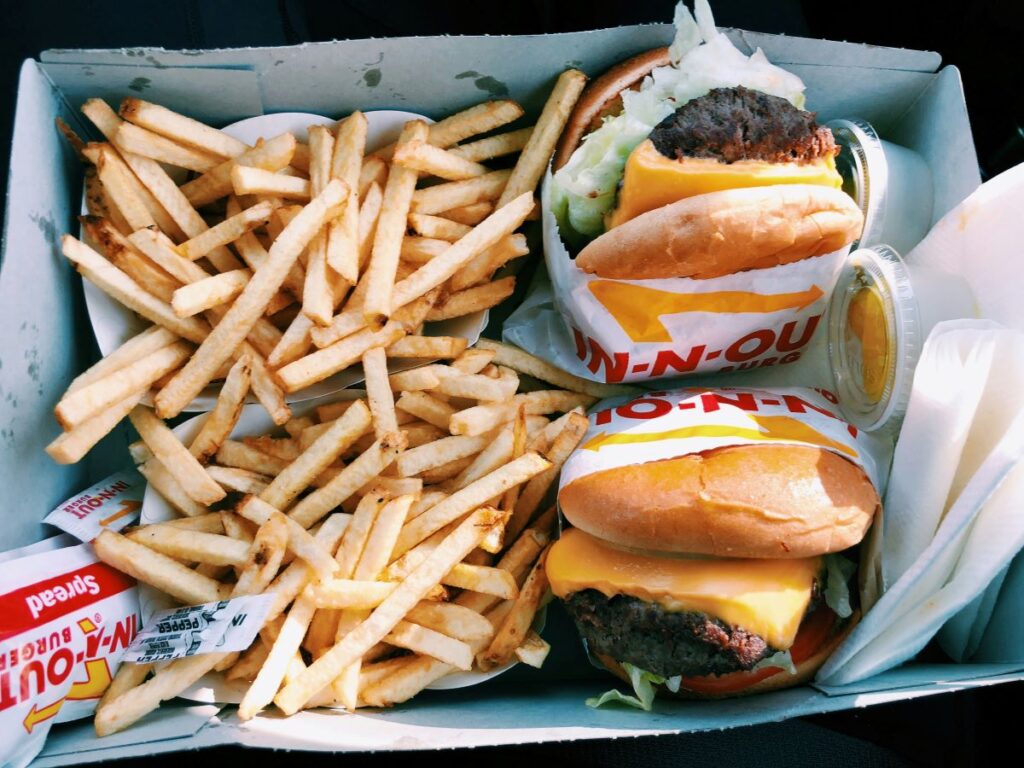Are you watching what you eat, controlling any indulgence, giving up your favorite foods, and squeezing in time to exercise despite your crazy schedule but can’t drop even a couple of pounds? Have you tried diet plan after diet plan, maybe lost a few pounds only to gain them right back? Whatever your story, I totally get it! I struggled for over 10 years trying to lose 15 pounds but failing time after time. What if I told you that there are 5 key changes you can make to improve your weight? I start by explaining why you may be struggling to lose weight (and it’s not a lack of willpower!). I’ve also included three things you can do today to start losing weight and keep it off.

Why Losing Weight is Harder in Our 40s and 50s
Struggling with our weight seems to be a foregone conclusion for women as we age. In fact, as we move through and past our 40s, changes in our body typically make managing our weight more challenging. Let’s look at five key changes in our body that contribute to weight gain.
1. Metabolic changes
Metabolism is the process of our body getting energy from food. The way that we metabolize food changes as we age and can affect how easy it is to lose weight. Two key factors that contribute to a slower metabolism are a decrease in muscle mass and physical activity levels. These impact blood sugar control and how well your body is able to metabolize foods that contain carbs. Many moms also experience reduced activity levels due to work demands, caregiving responsibilities, or hormonal fluctuations, further contributing to a decline in metabolism.
2. Muscle loss
Muscle mass naturally declines as we age, and this can also lead to a slower metabolism. This can stem from a combination of factors, including a sedentary lifestyle, diet factors, chronic health conditions, and, to a lesser extent, genetics. Since muscle burns more calories than fat, a reduction in muscle mass means fewer calories burned at rest. Changes in hormone levels over time may also affect our muscle mass in our 40s.
3. Hormonal changes
Menopause and the stage leading up to it, perimenopause, involve a range of hormonal changes. As a result, our body composition and where our body stores fat can also change.
For women in their 40s, a decrease in the production of the hormones estrogen and progesterone can contribute to weight gain. Estrogen helps regulate body weight by affecting fat storage and metabolism. Decreasing levels of estrogen can contribute to an increase in body fat, particularly in your abdomen. In addition, menopause symptoms like hot flashes and night sweats, which affect sleep and mood, can disrupt metabolism and appetite-regulating hormones, further hindering weight loss efforts. Still, even with a healthy diet and exercise, decreased estrogen also impacts the way your body breaks down cells that store fat, your appetite and your energy levels.

4. Constant stress
“Stress can have devastating long-term consequences for health.” – Dr Rangan Chatterjee.
Stress is prevalent in our society affecting people at most ages and is a significant health topic that I will continue to address. Specifically, moms often juggle multiple responsibilities, including careers, family, and caring for aging parents. Chronic stress associated with these responsibilities can lead to hormonal imbalances, increased cortisol levels, and emotional eating, making weight loss more challenging. In fact, stress and elevated levels of cortisol, a hormone released during times of stress, contribute to the accumulation of visceral fat in the body. This type of fat is stored deep within the abdominal cavity, surrounding the internal organs, such as the liver, pancreas, and intestines. It is often described as “belly fat” and is associated with an increased risk of various health conditions, including heart disease, type 2 diabetes, and metabolic syndrome.

5. Lifestyle factors
The rise of convenience culture and hectic lifestyles has led to a greater reliance on quick and easy food options that require minimal preparation. Ultra-processed foods are often readily available, highly convenient, and marketed aggressively, making them attractive choices for busy families. These can have a significant impact on weight, often contributing to weight gain and obesity because they’re typically high in calories, added sugars, unhealthy fats, and sodium, while being low in essential nutrients, fiber, and protein. In addition, this convenience culture has led to many things “at our fingertips” and reduced our need to be physically active.
Five Changes You Can Make to Lose Weight
The good news? You can make changes to manage your weight even though your body might be priming itself to gain weight quicker or store fat in different places. To be clear, I consider body weight less in terms of losing, or gaining, and more in terms of reaching a “healthy weight”. Because healthy weight is different and unique for each of us and depends on many factors. Below are five effective changes you can make to reach your healthy weight.

1. Eat and drink well
How your diet and eating habits affect your weight can change as you get older. So figuring out what foods are best for you at a particular time can help you manage your weight. Firstly, calorie counting doesn’t work for sustained weight loss for most people. So, rather than only focusing on your energy intake (calories), it’s more effective to focus on the quality of your food. With this in mind, these tips can help you improve the quality of the food and drink you consume and, ultimately, help you manage your weight:
- Prioritize plants first. Vegetables and fruits fill you up, contain beneficial compounds, and reduce the risk of diseases.
- Switch to whole grains. Eating whole grains supports weight management and reduces inflammation while supporting your gut microbiome.
- “Unprocess” your diet. Ultra-processed foods can leave you still feeling hungry. They often contain lots of added sugars and few nutrients. So, whenever possible, swap out ultra-processed foods for less processed or minimally processed options.
- De-normalize sugar. If you’re eating processed food there’s a very good chance that your intake of sugar is extremely high. Sugar is finding its way into more and more of our foods. Get in the habit of reading the label on your food to check the sugar content keeping in mind that ingredients are in the order of highest to lowest weight.
- Create a protein-rich diet. A 2016 study found that a high-protein diet helped older adults maintain muscle and lose fat. High-protein foods include lean meats, fish, legumes, seeds, and nuts.
- Drink more water. Some health benefits you may experience from drinking more water include fewer headaches, increased energy levels, better bowel function, longer periods of concentration and reduced cravings for sugar.
For more tips on healthy eating, check out the Healthy Eating Foundations post.
2. Introduce Intermittent Fasting
“Get into the habit of eating all of your food within a twelve-hour time window.” – Dr Rangan Chatterjee.
Intermittent fasting is an eating pattern that cycles between periods of fasting and eating. It doesn’t prescribe specific foods to eat or avoid but rather focuses on when to eat. Time-restricted eating is the most popular type of intermittent fasting. It involves eating during a specific time window each day. So, you might only eat between 8 am and 8 pm, for example. Other things to consider are waiting at least 1 hour after you wake before you eat and stopping at least 2 to 3 hours before you go to sleep. As soon as you start to give your body a break from eating, incredible things start to happen. Numerous studies show that when you condense your eating window, leaving more time for fasting, you will reduce total body fat percentage, visceral fat and waist circumference among other important health benefits.

3. Move your body
“In a sedentary world, movement is a superpower.” – Nilofer Merchant
Children, work, and life in general can keep us extremely busy and finding time to be physically active might be challenging. However, although movement alone may not help you reach a healthy weight, it plays an important part in maintaining weight loss. It also has a wide range of other health benefits. This doesn’t mean that you have to start with gym sessions or runs. Gardening, dancing, walking, doing housework or simply taking the stairs instead of the elevator can all boost your activity levels. In addition, it’s crucial for women to prioritize resistance training (aka strength training). Incorporating resistance training into your routine can help preserve and build muscle mass, counteracting the natural decline in metabolism. As always, the right balance is crucial. It is possible to push yourself too hard when exercising, creating stress and damaging your health.
Bottom line is that our lives have become too sedentary but our bodies are built for movement.
Adding movement to our routine is a very important health topic which I will be covering in an upcoming post.

4. Prioritize quality sleep
“Sleep is the Swiss army knife of health. When sleep is deficient, there is sickness and disease. And when sleep is abundant, there is vitality and health.” – Matthew Walker.
Given our hectic schedules, sleep often doesn’t get the space in our lives that it deserves. However, it’s crucial to prioritize quality sleep. Adequate sleep not only supports hormone regulation but also enhances metabolism and appetite control. Key things to achieve are:
- Aim for 7-9 hours of sleep each night
- Establish a consistent sleep schedule and create a relaxing bedtime routine
- Limit screen time before bed
- Make your bedroom a comfortable and calming space conducive to sleep. Keep the room cool, dark, and quiet.

5. Reduce stress
“Stress is not what happens to us. It’s our response to what happens. And response is something we can choose.” – Maureen Killoran
As we discussed in the last section, if you endure stress for long periods, your body makes too much cortisol and other stress hormones leading to weight gain from the accumulation of visceral fat in the body. Stress may also lead to stress eating. Stress eating could relieve stress in the short term. However, you’ll want to find healthy long-term methods that reduce your stress without weight gain. Some tips to reduce stress include:
- Prioritize Self-Care. Dedicate time each day for self-care activities that promote relaxation and well-being. This could include activities such as meditation, yoga, deep breathing exercises, taking a bath, or spending time in nature.
- Establish Boundaries. Learn to say no to commitments and obligations that cause excessive stress or overwhelm. Set boundaries around your time and energy, and prioritize activities that bring you joy and fulfillment.
- Practice Gratitude. Cultivate a mindset of gratitude by focusing on the positive aspects of life and expressing appreciation for the things you are grateful for. Keeping a gratitude journal or simply reflecting on what you’re thankful for each day can help shift your perspective and reduce stress.
- Maintain a Healthy Lifestyle. Focus on nourishing your body with nutritious foods, staying hydrated, and getting regular exercise. Regular physical activity can help reduce stress levels and improve mood by releasing endorphins, the body’s natural stress-relieving hormones.
- Engage in Stress-Reducing Activities. Find activities that help you unwind and relax, such as reading a book, listening to music, gardening, or pursuing hobbies and interests. Engaging in enjoyable activities can help distract from stressors and promote relaxation.

3 Things You Can Do Today
In addition to the five changes you can make to lose weight we covered in the previous section, I recommend doing these three things today to kick start you on your journey to improving your weight.
1. Download the FREE tracker
I’ve prepared a free, easy to use tracker that you can download today. The Energize Your Day Tracker is aimed at increasing your energy and vitality. In addition, the habits improve weight management and mood. This is the tool I wish I had when I was trying to make these habits stick.


2. Go for a walk outside
Schedule at least 10 minutes to go for a walk outside today – try for 20 minutes or more if possible. It could be during your lunch break, while the kids are doing their homework or an activity, or after dinner before cleaning. In fact, taking a short walk within an hour of eating a meal helps digestion and regulates blood sugar. For many of us, walking is a great way to increase daily movement and the start of the journey from moving very little to optimal movement. Taking a walk today isn’t just about getting some fresh air; it’s a powerful act of self-care and movement. Stepping outside allows you to breathe deeply, connect with your neighborhood, and clear your mind from the stresses of the day.
3. Plan a good night’s sleep
Take 2 minutes right now to intentionally schedule your sleep tonight by following the steps below:
- Plan what time you will go to sleep tonight – plan for at least 7 hours of sleep
- Plan what time you will stop eating or drinking sugary drinks – plan for at least 2 hours before your bedtime.
- Plan the time you will put down your devices and exposure to blue light – aim for at least 30 minutes before you plan to go to bed
- Plan a soothing routine for the 30 minutes before you go to bed – this can be anything that relaxes and calms you so it’s very personal. Some ideas include reading a book, taking a warm bath, practicing gentle yoga or meditation, listening to soothing music or nature sounds, journaling, or reflecting on the things you’re grateful for.
Wrap-Up
There you have it! My 5 changes you can make, plus 3 things you can do today, to lose weight and get to your healthy weight without calorie counting and giving up your favorite foods. Now that you understand why you’re struggling, you can start to make the changes that are right for you. To kickstart your journey, try the three things you can do today including downloading the FREE tracker to help you make the habits stick. And remember, it’s not about the number on the scale but about nourishing your body, enhancing vitality, and embracing the journey towards lifelong wellness.
Have you already tried some of these changes but are still struggling to lose weight? I see you and I get you! Managing your weight is so much more challenging in and after your 40s. You will not get it right the first time, and some days will be harder than others. I’m here to help! You can schedule a FREE coaching session tailored to your unique challenges and goals. Let’s work together to uncover personalized strategies for sustainable weight loss success.
YOU have the power to take the steps to mindfully transform your wellness on your personal journey.
The content provided in this post is for informational purposes only and is not intended to be a substitute for professional medical advice, diagnosis, or treatment. Always seek the advice of your physician or other qualified health provider with any questions you may have regarding a medical condition. Never disregard professional medical advice or delay in seeking it because of something you have read in this post.













This blog is great and full of useful information. Thank you, Alex!
Thank you so much for your feedback, Tanya! I’m so glad you found this blog post useful.
I do not even know how I ended up here but I thought this post was great I dont know who you are but definitely youre going to a famous blogger if you arent already Cheers
Thank you so much for your feedback, Bridgette! I’m so glad you found the post helpful. I’m just starting out and not a famous blogger 🙂 I’ve recently started as a health coach for moms in menopause. I have regular educational posts on Instagram currently including a weekly Live Q&A. Basically, I’m dedicated to empowering women take back control of their health.